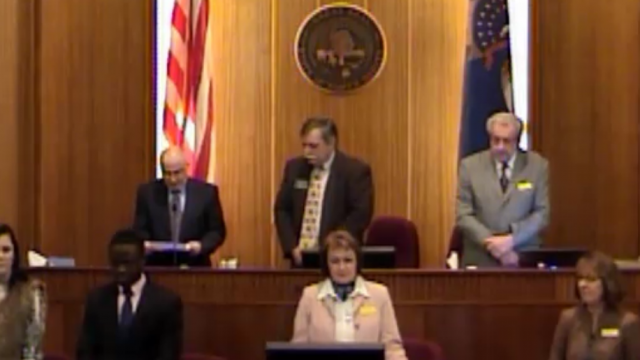No Prayer Is No Solution

As an atheist I’ve never really had much of an opinion one way or the other about religious invocations before public meetings. It’s not my thing, so I tend to be ambivalent, but I understand how those who adhere to one spiritual school of thought or another can find them inspiring and uplifting, particularly coming as they do before meetings where hard decisions are often made.
And I’ll admit that I’ve always admired how the North Dakota Legislature handles invocations. Before each floor session in the House and Senate chambers one of a rotating cast of religious leaders – including everything from Catholic priests to Native American leaders – delivers some words to lawmakers.
[mks_pullquote align=”right” width=”300″ size=”24″ bg_color=”#000000″ txt_color=”#ffffff”]We accept that the price of living in a free society is sometimes having to listen to speech we don’t agree with. Why should it be any different with prayer?[/mks_pullquote]
That’s why I was so put off by efforts by some in the state House to block an invocation by a Muslim leader. The invocations in the Legislature had, prior to that ugly incident, been representative of the mix of religious beliefs North Dakotans adhere to. Now, not surprisingly, some want to end the invocations all together.
Case in point, this letter to the Fargo Forum. “Why should anyone in this great country be forced to listen to a prayer they don’t agree with?” the author, John Hougen of Bismarck, asks. “I’d suggest we go a bit further and get to the root of the problem and eliminate opening prayers to all secular public meetings.”
That is perhaps an understandable reaction to the Muslim invocation flap, but not one in keeping with our state and nation’s spirit of free religious expression I’m afraid.
Far too often people respond to religious controversy with efforts to push religion from the public square. But the “separation of church and state” doctrine is a wrong-headed interpretation of the 1st amendment. We shouldn’t take religion out of public places. We should invite all religious viewpoints into public spaces.
Mr. Hougen asks why anyone should have to listen to a prayer they don’t agree with, but what if we applied that thinking to speech which is another 1st amendment protected activity?
We accept that the price of living in a free society is sometimes having to listen to speech we don’t agree with.
Why should it be any different with prayer?
Rep. Dwight Kiefert and anyone else who opposed the Muslim invocation at the Legislature deserve criticism. But let’s not turn their stupid actions into an assault on all religious expression at the Legislature.




